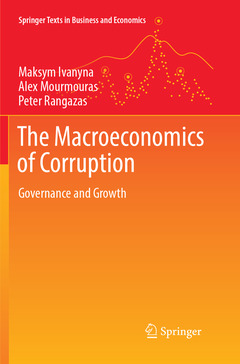The Macroeconomics of Corruption, Softcover reprint of the original 1st ed. 2018 Governance and Growth Springer Texts in Business and Economics Series
Auteurs : Ivanyna Maksym, Mourmouras Alex, Rangazas Peter

Examines corruption through a macroeconomic lens, exploring the relationship between corruption, fiscal policy, and political economy
Applies models that analyze the causes and consequences of rising income inequality, long-term economic growth slowdowns and fiscal crises
Contains ancillary materials including a technical appendix, end-of-chapter questions and problems, and a complete solutions manual
Includes supplementary material: sn.pub/extras
Request lecturer material: sn.pub/lecturer-material
Date de parution : 09-2018
Ouvrage de 304 p.
15.5x23.5 cm
Thèmes de The Macroeconomics of Corruption :
Mots-clés :
macroeconomics; corruption; economic policy; fiscal policy; political economy; growth; income inequality; equilibrium



